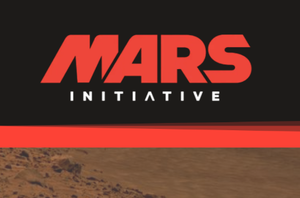Mars Initiative

The Mars Initiative is focused on utilizing individual donations to incentivize crewed missions to Mars while supporting space sector start ups and inspiring students to study space. Founded in 2011 by Mina Mukhar and Chris Bellant as a 501.c.3. non-profit organization based in Houston, Texas, the Mars Initiative works to inspire and accelerate a human landing on Mars through individual donations from around the world. is a 501.c.3. non-profit organization based in Houston, Texas, founded in 2011 by Mina Mukhar and Chris Bellant to inspire and accelerate a human landing on Mars through individual donations from around the world.[2][3][4]
The organization's primary fundraising vehicle is the Mars Prize Fund, a crowdfunded Prize intended to offset high development costs associated with the first crewed Mars mission.[5] The Mars Initiative also crowdfunds two grant programs, the Micro-G Education Grant and the newly formed Space Innovation Grant.[6][7]
The specific goals of the Mars Initiative are:
- Empower everyone on Earth to participate in humanity’s first steps on Mars.
- Accelerate humanity becoming an interplanetary species.
- Educate and inspire the generation that will first explore Mars in person.
- Fund the innovators of today, creating the necessary technologies for the explorers of tomorrow.
As of September, 2021 the Mars Initiative has raised more than $25,000 between its various funds, with the growth rate accelerating over time.
The Mars Prize Fund
The Mars Prize Fund is the longest running Mars Initiative fund, started in 2011. It is an incentive intended to accelerate the “New Space Race”, to be awarded to the organization that first lands a human safely on Mars. The Mars Prize Fund is open to any and all contributors, and recently began accepting cryptocurrencies in a HODL strategy.[8]
A “Mars Mile” is the estimated mission cost ($30 billion) divided by the approximate distance to Mars (300 million miles), or $100 per “Mars Mile”. Any individual or corporation who achieves a “Mars Mile” is acknowledged for their contribution. As of November 9, 2021, the Mars Prize fund is worth more than $25,000, with donations from individuals spanning 40 different countries, and an upward growth trajectory.
The Micro-G Fund
Established in 2016, the Education Micro Grant (Micro-G) Fund awards up to $200 to educators to further the teaching of space related lessons in their classrooms. As of March 2021 the Education Micro-G program has awarded 10 grants, reaching over 450 students throughout the United States and included the purchase of a SunSpotter telescope and materials for NASA’s ANGLeS Challenge. A 2016 grant to Teachers in Space was particularly productive, with their purchase of Ardusat Space Kits training dozens of teachers and resulting in programming in multiple states.[9][10] This training experience was critical to Teachers in Space and laid the foundation for other successful projects. The Mars Initiative is working to expand this grant to international educators in 2021.
The Space Innovation Grant
The Space Innovation Grant is a grant for Mars and space-related start-ups, small companies, and other small space related groups. The Mars Initiative is currently supporting 3 space sector start up companies: Neutron Star Systems, Stellar Amenities, and Project Helios.[11][12][13] The intent of the grant is to ensure these companies can keep innovating without having to worry about a lack of funding.
Volunteer Culture
The Mars Initiative is an all-volunteer organization, decreasing overhead costs to near zero. Volunteers have come from multiple countries but mainly come from the United States, and volunteer applications remain open.
- ↑ https://marsinitiative.org/
- ↑ https://marsinitiative.org/
- ↑ https://www.satellitetoday.com/podcast/2020/09/14/to-mars-and-beyond-with-chris-bellant-of-the-mars-initiative/
- ↑ https://www.houstonchronicle.com/news/houston-texas/space/article/Pearland-nonprofit-s-pitch-100-equals-one-15750321.php
- ↑ https://marsinitiative.org/the-mars-prize-fund/
- ↑ https://marsinitiative.org/mars-microgrants/
- ↑ https://marsinitiative.org/sig/
- ↑ https://en.wikipedia.org/wiki/Bitcoin#Term_%22HODL%22
- ↑ https://teachers-in-space.com/
- ↑ https://teachers-in-space.com/mars-initiative-and-teachers-in-space/
- ↑ https://www.neutronstar.systems/
- ↑ https://www.stellaramenities.space/
- ↑ https://project-helios.space/






